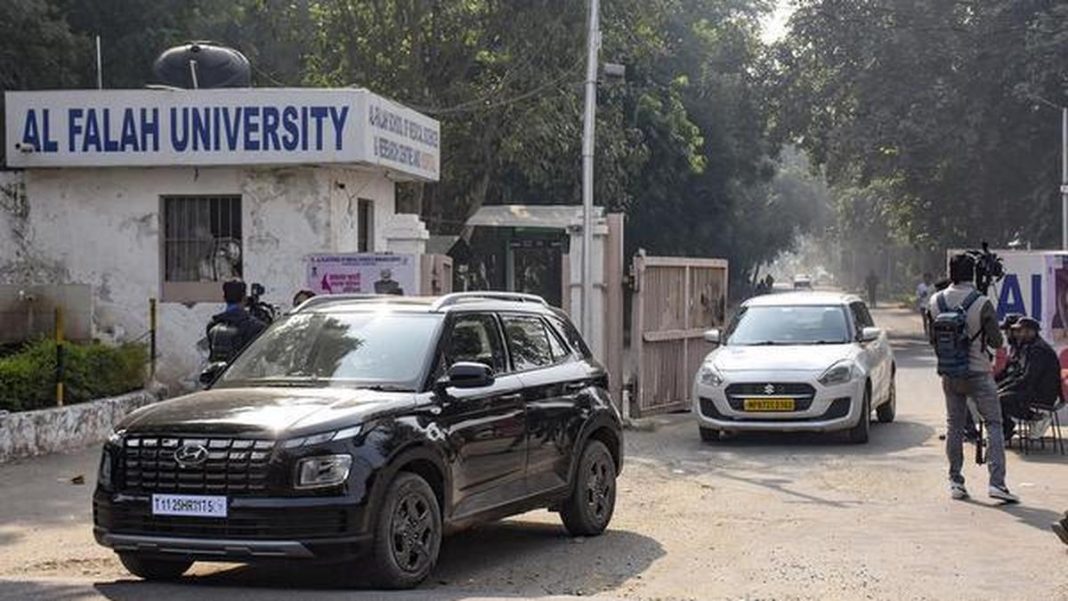Al Falah University, a private institution situated in Faridabad, Haryana, finds itself at the centre of a swirling storm, facing scrutiny from multiple directions. The university is currently under the scanner not just for serious allegations related to the January 26, 2024, Red Fort blast in Delhi but also for a significant breach of trust concerning its academic standing. The National Assessment and Accreditation Council (NAAC), India’s premier accreditation body for higher education institutions, has issued a show-cause notice to Al Falah University over claims of false accreditation, adding another layer of complexity to the institution’s already precarious position.
The NAAC Show-Cause: A Breach of Trust in Accreditation
The National Assessment and Accreditation Council (NAAC) plays a pivotal role in evaluating the quality of higher education institutions in India. Its accreditation is a benchmark for academic excellence, infrastructure, and governance. Therefore, the show-cause notice issued to Al Falah University by NAAC over alleged false accreditation claims is a matter of grave concern for the educational landscape and, more immediately, for the thousands of students enrolled at the university.
NAAC’s action stems from findings that Al Falah University may have misrepresented its accreditation status. While the specifics of the false claims are under wraps, such misrepresentation typically involves displaying a higher accreditation grade than awarded, claiming accreditation when none exists, or continuing to use an expired accreditation status. The gravity of this issue cannot be overstated. Accreditation is a critical tool for prospective students and their parents to gauge an institution’s quality and credibility. Falsely claiming or misrepresenting this status undermines public trust and can have severe repercussions for the validity of degrees awarded and the future prospects of graduates.
The show-cause notice demands a detailed explanation from Al Falah University, giving it a stipulated timeframe to respond and clarify its position. Failure to provide a satisfactory explanation could lead to severe penalties, including revocation of any existing accreditation, if applicable, or even legal action. This development underscores NAAC’s commitment to maintaining the integrity of the accreditation process and ensuring transparency in the higher education sector.
Shadow of the Red Fort Blast Allegations
Compounding Al Falah University’s woes are the serious allegations linking individuals associated with the institution to the January 26, 2024, Red Fort blast in Delhi. The Delhi Police Special Cell has been actively investigating the low-intensity explosion that occurred near the Red Fort during Republic Day celebrations. This investigation has reportedly led to claims of association involving an individual connected to Al Falah University.
While the investigations are ongoing and details remain sparse, the mere mention of a university in connection with a national security incident sends ripples of concern throughout the public and regulatory bodies. Such allegations, if proven, would cast a long shadow over the university’s reputation and its operational integrity. It highlights the intricate layers of scrutiny the institution is currently facing – from academic compliance to matters of national security.
It is crucial to note that these are allegations, and the legal process will determine the truth and culpability. However, the dual pressure of a NAAC show-cause notice and a high-profile police investigation creates an unprecedented challenge for Al Falah University, demanding immediate and transparent responses on both fronts.
Implications for Students and the University’s Future
The parallel challenges faced by Al Falah University have immediate and far-reaching implications, most notably for its student body. Students who have invested their time, money, and future aspirations in the institution are now grappling with uncertainty regarding the value and recognition of their degrees. A tarnished accreditation status can affect employability, while the national security allegations could significantly damage the university’s brand and reputation.
“The sanctity of accreditation lies in its truthful representation,” stated Dr. Anjana Sharma, a prominent education policy analyst. “When an institution falsely claims NAAC accreditation, it not only misleads thousands of prospective students but also compromises the integrity of the regulatory framework designed to ensure quality education. This incident, coupled with other serious allegations, demands a thorough probe to protect student interests and uphold educational standards.”
The university’s leadership faces the daunting task of navigating these dual crises. Their response, or lack thereof, will be critical in determining the institution’s future trajectory. Transparency, cooperation with investigative agencies, and a demonstrable commitment to rectify any proven academic lapses will be paramount to rebuilding trust among stakeholders.
Al Falah University currently stands at a critical juncture, with its academic integrity and broader public standing under severe threat. The NAAC show-cause notice regarding false accreditation claims, coupled with the ongoing police investigation into the Red Fort blast, presents a complex web of challenges. The coming weeks will be crucial as the university prepares its responses to these weighty accusations, underscoring the vital need for accountability and transparency in India’s higher education sector to safeguard student interests and public trust.




